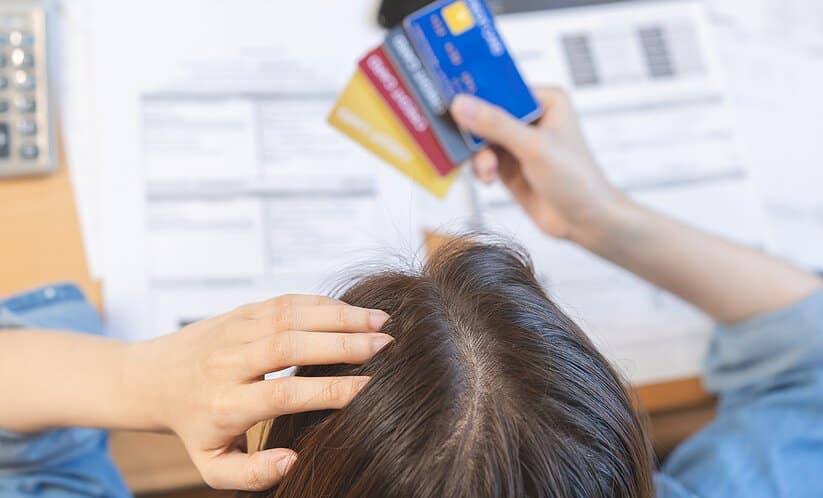
Excessive debt? Take this quiz to find the best solution for you.
A purchase here, a splurge there.
Every swipe adds a bit more to the balance. And before we realize it, we're facing a mountain of debt.
So what's the difference between a manageable balance and a looming crisis?
Let’s unpack this to understand when credit card debt goes from a mere inconvenience to a financial nightmare.
The Real Cost of Credit Card Debt
Credit cards can be tricky. While they're easy to swipe, the cost behind them can grow fast.
High interest rates mean you end up paying more than what you borrowed. Missed a payment? Expect extra fees added to your bill. And, let's not forget, too much debt can hurt your credit score. This could make things like getting a loan or renting an apartment harder in the future.
The Federal Reserve's report on consumer debt tells us that carrying too much debt can weigh us down. It's not just about owing money, but also about how it affects our plans and peace of mind. Remember, when looking at your credit card bill, it's not just today's cost, but tomorrow's worries too.
5 Signs Your Credit Card Debt Is Too High
CNBC’s guide on credit card debt shares similar concerns, emphasizing the need to watch for these signs and take control early.
4 Benchmarks for Healthy Credit Card Usage
Experian's data on average credit card debt supports these benchmarks. It shows that those who stick to such rules often manage their debts better and enjoy more financial freedom.
Alternatives and Solutions to Excessive Debt
No one plans to drown in debt. But when bills pile up, and the stress builds, finding a clear path out can seem daunting. The good news? There are several routes on how to get out of debt without filing bankruptcy.
Debt Consolidation: This is a way of combing all your credit card debts into one. Instead of juggling multiple bills, you'll get a loan at a lower interest rate and pay off all our existing credit card debts so you have just one monthly payment. It simplifies the process but remember to read the fine print. Some debt consolidation loans might end up costing you more in the long run.
Debt Settlement (aka "Debt Negotiations"): Ever wondered how to get credit card debt forgiven? Debt settlement could be the answer. Companies like Donaldson Williams negotiate with creditors to reduce the amount you owe. It's a viable strategy for those overwhelmed with massive debts. You can learn more about this here to see if debt settlement is right for you.
Of course, embarking on debt negotiations isn’t a walk in the park. It requires understanding, persistence, and sometimes tough decisions. For those with questions on navigating this tricky terrain, check our the credit card debt settlement FAQ page.
Credit Counseling: This involves working with a professional who can offer guidance on managing your debts and finances. They might even help you get reduced interest rates.
Wondering about the differences between debt consolidation and debt settlement? Both have their pros and cons. While consolidation makes managing debt simpler, debt settlement could decrease the amount you owe. Dive deeper into the comparison here.
Bankruptcy: While many search for ways on how to get out of debt without filing bankruptcy, sometimes it may be the only choice. It's a severe step with long-lasting consequences for your credit, but it can offer a fresh start in dire circumstances.
If you're considering bankruptcy, check out our guide, "When Should Someone File For Bankruptcy?" where we discuss the pros and cons of bankruptcy.
FAQ: Can I still use my credit card after debt settlement?
No. If you settle an outstanding credit card balance via debt settlement, that account will be closed and you won't be able to use it. Therefore, any credit cards that you still need to use (to function in today's digital world) cannot be included in a debt settlement strategy.
FAQ: What happens if I stop paying my credit cards?
Stopping payments on your credit cards will have several effects. As you might expect, your debt will grow (due to accruing interest and late fees) and your credit score will drop. After a few missed payments, your account will be transferred to the credit card company's in-house collection department or possibly a collection agency. If you wish to attempt debt settlement on an outstanding credit card balance, it usually happens with the credit card company's in-house collection department or collection agency because your account must be past due to be eligible for debt settlement.
Preventing Future Debt Buildup
Staying out of debt is a bit like staying fit – it requires consistent habits and a keen eye on the end goal. Here's how to ensure your credit card balance stays manageable in the future:
Remember, avoiding debt buildup isn't just about resisting temptation. It's about creating a lifestyle that values financial freedom and the peace of mind that comes with it.
Conclusion
Facing up to credit card debt isn't easy, but it's an essential step towards financial freedom.
Recognizing the signs of excessive debt and knowing the paths available to address it are half the battle. As you journey towards a debt-free life, remember that building strong financial habits is your best defense against future debt.
It's never too late to take control, make informed choices, and pave the way for a secure financial future. Whether you're considering debt consolidation, debt settlement, or simply refining your spending habits, every step you take is a move towards a brighter, debt-free tomorrow.
